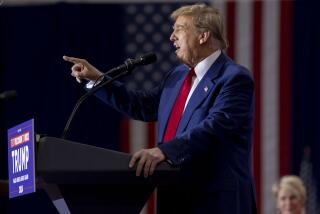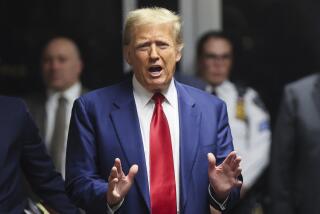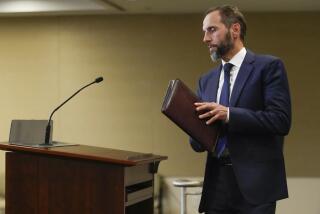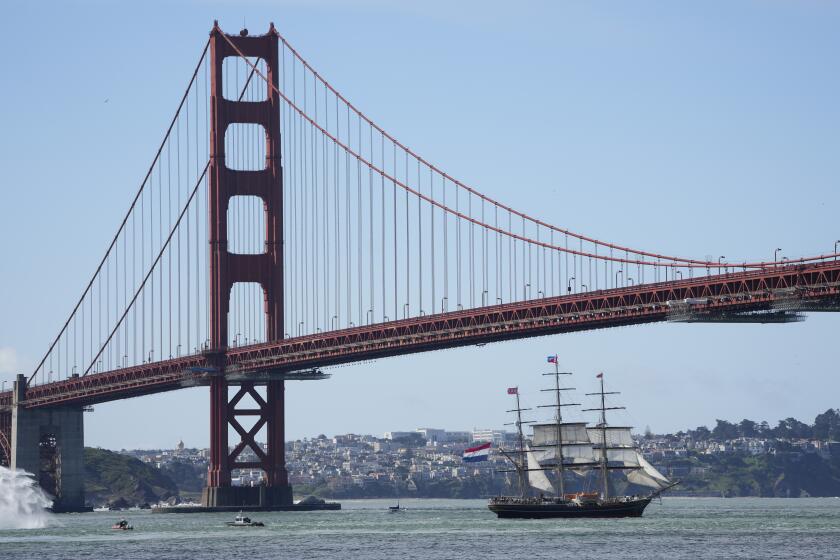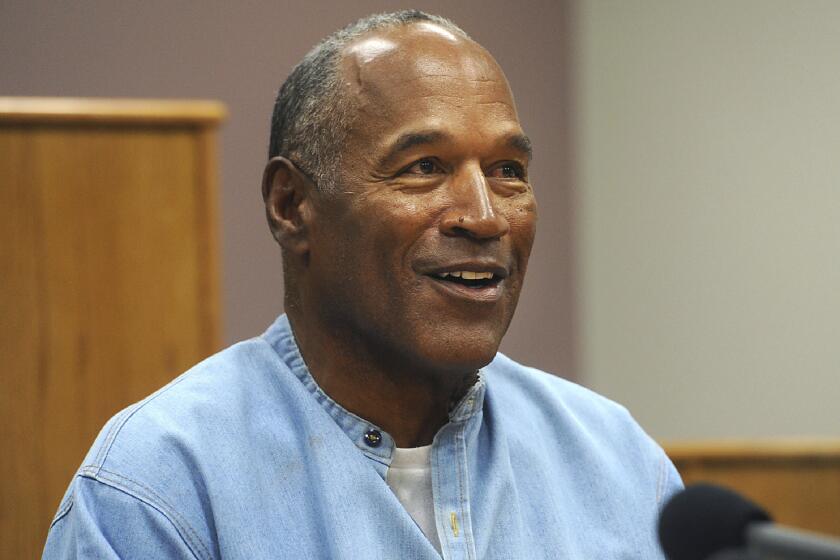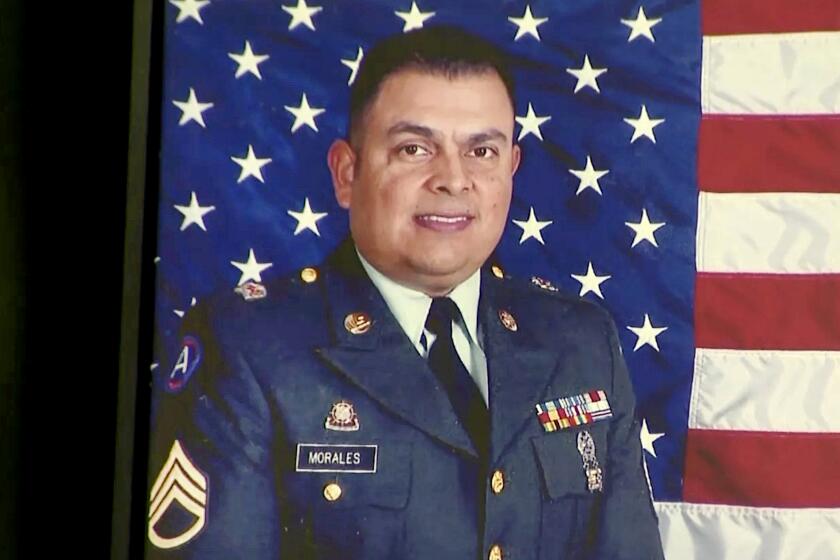Judge Halts Moussaoui Terror Trial
ALEXANDRIA, Va. — The prosecution’s carefully laid strategy to secure the death penalty against confessed terrorist Zacarias Moussaoui neared collapse Monday when an incensed federal judge halted his sentencing trial and ordered a hearing to investigate apparent witness tampering by government officials.
U.S. District Judge Leonie M. Brinkema took under advisement a defense request to drop the death penalty from the case, which would leave life in prison as the only possible sentence.
After four days of testimony in the government’s showcase trial growing out of Sept. 11, its prosecution appeared to be unraveling.
“In all the years I have been on the bench,” Brinkema told a hushed and crowded courtroom, “I have never seen such an egregious violation.”
A judge for 12 years, she called a government lawyer’s attempt to shape the testimony of seven key witnesses a “significant error affecting the constitutional rights of this defendant and, more importantly, the integrity of the criminal justice system in this country.”
Moussaoui unexpectedly pleaded guilty last year to capital murder for having a role in the Sept. 11 conspiracy; the government has made it a top priority to win the death penalty under the theory that — although he was in jail at the time of the attacks — he could have prevented them by telling the FBI about the plot.
Monday’s developments marked another major embarrassment in the Justice Department’s attempts to prosecute alleged terrorists.
Earlier terrorist convictions in Detroit were set aside because of prosecutorial misconduct. And the sentences imposed in terrorism cases in Buffalo, N.Y., are in jeopardy because of the Bush administration’s controversial program of warrantless wiretaps. Prosecutions in Boise, Idaho; Portland, Ore.; and elsewhere have foundered as well.
At issue in the Moussaoui case is the pending testimony of seven Federal Aviation Administration officials who were prepped by a lawyer for the Transportation Safety Administration.
The witnesses are considered crucial to the government’s effort to prove that had Moussaoui cooperated with the FBI upon his arrest in August 2001, critical information could have been relayed to the FAA to help stop the Sept. 11 hijackings.
Although some preparation of witnesses is common, Brinkema issued a special order Feb. 22 warning that in the Moussaoui case, witnesses must not be coached and should not be read or provided transcripts of opening statements or testimony of other witnesses.
The government notified the court Monday that Carla Martin, a senior TSA lawyer, had done just that by sending copies of court transcripts — as well as summaries of the testimony of FBI Supervisory Agent Michael Anticev, the government’s first witness in the sentencing phase — around to the seven witnesses.
“We really are left speechless, frankly,” prosecutor David J. Novak told the judge, conceding that Martin’s actions were “wholly improper” and could seriously hamper the government’s case.
“We’re really not in a position to defend her conduct,” Novak said.
Novak’s boss, U.S. Atty. Paul J. McNulty in Alexandria, Va., wrote the judge saying: “We view Ms. Martin’s conduct as reprehensible and we frankly cannot fathom why she engaged in such conduct.”
Without elaborating, prosecutors said Martin no longer worked for the TSA.
Defense lawyer Edward B. MacMahon Jr. immediately asked that the death penalty be stricken as a possible punishment for Moussaoui, 37, leaving life in prison with no parole as the only other option.
“This is not going to be a fair trial anymore,” he said, complaining the government was trying to shape witness testimony.
In Martin’s e-mails to witnesses, she voiced concerns that prosecutors were overselling to the jury the FAA’s ability to stop the hijackers at the airports and prevent them from boarding the four planes — even if Moussaoui had tipped off the government that the attacks were coming.
Her e-mails appeared aimed at protecting the interests of the FAA.
“We need to be careful in describing how these measures would have impacted the attack and be prepared,” she advised the witnesses, noting that security measures such as gate-screening procedures are not infallible.
“You need to read this transcript of the prosecutor’s opening statements,” she e-mailed March 7, the day after the trial began. “It is all about the FAA, and how it would have caught the hijackers and prevented 9/11.
“I believe there are more than a few errors here.”
That same day, Martin also sent around her “highlights” from the trial that, she said, “I’m not too happy about.”
They included whether the FAA in the days before Sept. 11 would have stopped anyone from boarding with small knives or box-cutters in their carry-on bags and, more broadly, whether the FAA was unfairly being cast as “the defense” that could have stopped the 19 hijackers with Moussaoui’s help.
“In other words,” she wrote in a subsequent e-mail Wednesday, Moussaoui’s lawyers “will exploit the fact that the FAA was not clued in to what was going on.”
Then she gave the witnesses pointed instructions: “You need to assert that we did not necessarily need to wait until we got all available information, that we acted independently; indeed, we had a statutory mandate to follow up on any issue that we thought was a threat to civil aviation.”
At one point she sent around her own version of “what I would have said in the opening” statement to the jury because she was “VERY CONCERNED” about how prosecutors had explained their case to the jury.
But, she wrote, “unfortunately we can’t redo this now.”
Martin also advised witnesses that she and “all of us aviation lawyers were stunned by the opening. The opening has created a credibility gap that the defense can drive a truck through.”
“There is no way anyone could say that the carriers [the FAA and the airlines] could have prevented all short-bladed knives from going through” security gates.
She further told them that when they were on the witness stand, Novak “MUST elicit that from you and the airline witnesses on direct [examination] and not allow the defense to cut your credibility on cross” examination.
She complained to the witnesses that “there are big gaps that the defense can exploit” and that all of the witnesses “have their work cut out for them.”
Martin could not be reached for comment Monday.
Officials at the TSA declined to talk about her e-mails and the problems they have posed for the trial.
Much of the Moussaoui case has been wrapped in secrecy for 4 1/2 years, but Brinkema insisted Monday that the Martin e-mails be unsealed.
“If the death penalty winds up being dismissed,” she said, “the public has a right to know how and why it happened.”
The judge plans to convene an extraordinary evidentiary hearing this morning to probe how deeply the prosecution’s case has been damaged.
All seven aviation witnesses, along with Martin, are expected to testify. The jury will not be present.
Brinkema will rule on whether to grant the defense team’s request to end the trial with a life sentence for Moussaoui.
Or she could rule that none of the seven aviation witnesses can testify before the jury. She could also conclude that no damage was done and the trial could proceed, although that seems unlikely.
Any of those actions could be appealed, raising the prospect of extensive delays and posing the question of whether to dismiss the jury — which took several weeks to select — and start over.
“This is a very significant problem that I have to think about and decide how I’m going to address it,” the judge said.
It follows on an earlier slip-up Thursday by the government when Brinkema admonished prosecutors for going too far in their questioning of FBI Special Agent Harry Samit.
Samit was the agent in Minneapolis trying to get Moussaoui to talk in the weeks before the Sept. 11 attacks, and he was asked by Novak whether Moussaoui had volunteered any information about the plot or admitted that he had lied to the FBI earlier.
The judge said the question was improper because it implied that Moussaoui should have volunteered information, when in fact he had the right to remain silent.
She also tipped her hand on how she felt about the death penalty for Moussaoui by suggesting the government wants him executed for what he did not do — alert the FBI about the plot.
“I don’t know of any case where a failure to act is sufficient for the death penalty as a matter of law,” she said.
As the judge left the bench at the close of the day Monday, Moussaoui was led away. At each break in the trial, he typically cries out, “God bless Osama bin Laden!” or “God curse America!”
This time he changed his tune.
“The show must go on!” he shouted.
More to Read
Start your day right
Sign up for Essential California for news, features and recommendations from the L.A. Times and beyond in your inbox six days a week.
You may occasionally receive promotional content from the Los Angeles Times.
